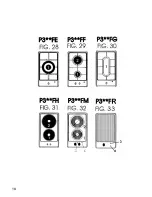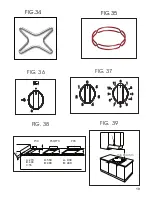
Electric hotplates
Switching on the hotplate
To switch on the electric hotplate, turn the knob to the desired position.
Numbers 1 to 6 or 1 to 11 (fig. 3
7
), depending on whether the cooktop is fitted with a power switch
or regulator, indicate the settings in progressing temperature (See Table).
When the electric hotplate is in operation an indicator led on the control panel lights up.
Using the electric hotplate
Once the pan has reached the boil, adjust the power to suit the intensity of heating required,
bearing in mind that the hotplate will continue to emit heat for several minutes after being switched
off.
When using the hotplate, remember:
)
Never under any circumstances use the hotplate without a suitable receptacle.
Idle
operation of the hotplate, especially for prolonged periods of time, can cause fires.
)
Take all precautions possible to avoid spilling liquids onto the hotplate when it is hot.
)
Use flat bottomed pans only with a diameter such as covers the entire burner surface.
Knob position
Type of cooking
0
0
Off
1
2
1
2
For melting (butter or chocolate)
2
2
3
4
For keeping food warm or reheating small
amounts of liquids
3
4
5
6
Reheating larger quantities, whipping creams
and sauces
4
7
8
Simmering, soups, pasta, risottos,
continuation of steaming, cooking steaks and
fries in general
4
5
8
9
10
Browning meats, roast potatoes, fried fish and
for bringing large quantities of water to the boil
6
11
12
Brisk frying, griddling steaks etc.
Type of hotplate
The cooktop may be equipped with a conventional or rapid hotplate.
The conventional hotplate is entirely black, while the rapid hotplate has a red dot in the centre.
For technical specifications refer to
“Cooktop Specifications– Cooking point”
Essentially, the rapid hotplate differs from the conventional one because it offers :
)
Greater power.
)
More rapid reaching of desired temperature.
Glass-ceramic cooktop.
The glass-ceramic cooktop permits rapid vertical transmission of heat from the heating element
below the cooktop to the pots or pans placed on top of it.
Heat does not spread horizontally, thus at a distance of just a few centimetres from the cooking
zone, the glass remains ” cool” to the touch.
The cooking zones are controlled by a power switch with 7 different positions or by a continuous
regulator with 13 positions, as shown in figure 3
7
Never cook food directly on the electric hotplates;
always use suitable pots or containers
6
Summary of Contents for built-in cooktops
Page 1: ...INSTRUCTIONS BOOKLET built in cooktops ...
Page 2: ......
Page 16: ...14 ...
Page 17: ...15 ...
Page 18: ...16 ...
Page 19: ...17 ...
Page 20: ...18 ...
Page 22: ...C Min 3 mm D E Min 10 mm 20 FIG 41 FIG 40 FIG 42 FIG 43 FIG 44 FIG 45 ...
Page 25: ...23 ...
Page 26: ...24 ...
Page 27: ......
Page 28: ...01Q038 ...









































